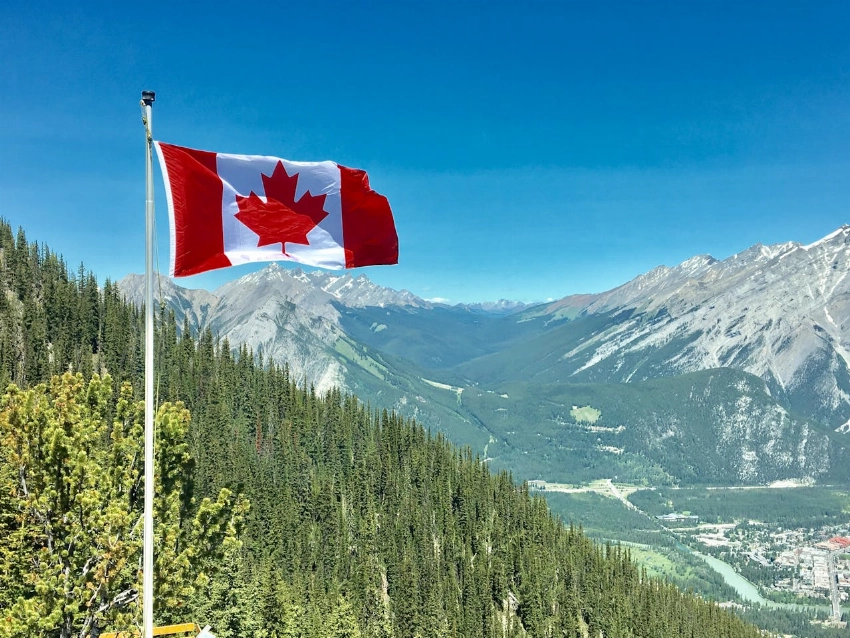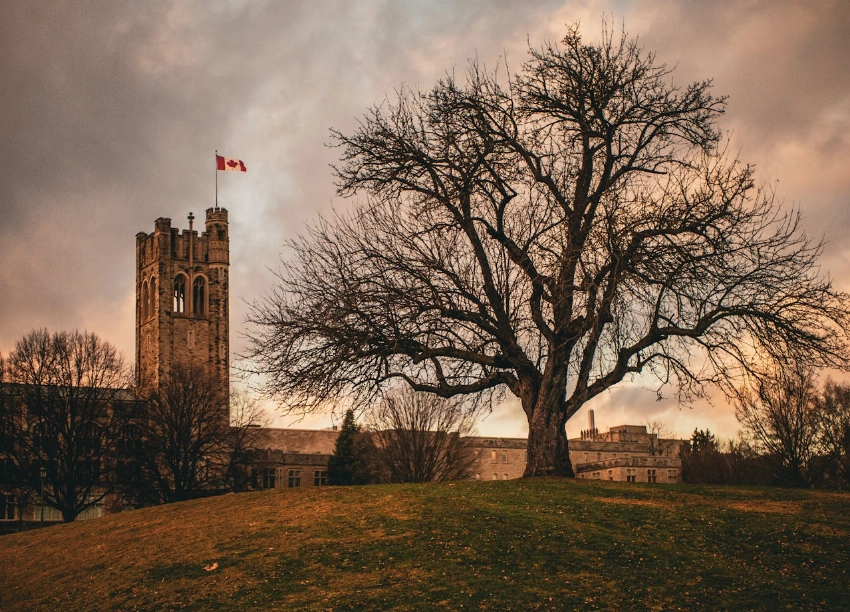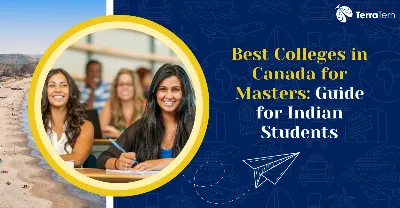Key Highlights
- Which Are The Best Canadian Colleges To Study For a Master's?
- What are the Key Differentiators for Indian Students in Canada 2025?
- What is The Cost of a Master's Degree in Canadian Colleges in 2025?
- What are the Recommended Master Programs offered in Canadian Colleges?
- Which Canadian Colleges Accept Low GPA for Masters Programs?
- How to Apply for Masters Programmes in Canadian Colleges?
- What Are the Career Opportunities After a Master's in Canada?
- 2025 Industry Trends and Latest Developments
- Conclusion
In 2025, Canada will still be the colleges in Canada for Masters. The educational landscape in the country is varied and of high quality, with more than 3,200 programmes accredited in 96 or more public universities. The best schools, such as the University of Toronto, McGill University, and the University of British Columbia, are offering research opportunities on a global level with good global prestige. A reasonable tuition fee of CAD 16,000-35,000/year and generous work permits after studies and articulate routes to permanent residency are excellent options for pursuing any higher studies and long-term career advancement. Let’s know more about colleges in Canada for Master's!
Which Are The Best Canadian Colleges To Study For a Master's?

After considering an in-depth review of international surveys on university ranking, academic reputation, and offers, the following colleges in Canada for Masters.
|
University |
QS World University Ranking 2025 |
Location |
Key Strengths & Popular Programs for Indian Students |
|
University of Toronto |
#25 |
Toronto, Ontario |
- Leading research institution with a global reputation - Strong in Computer Science, Business Administration (Rotman School of Management), and Engineering - Diverse student body and extensive alumni network |
|
McGill University |
#29 |
Montreal, Quebec |
- Renowned for diverse programs and a strong international community - Excellent for Business (Desautels Faculty of Management) and Engineering - Located in a bilingual and culturally rich city |
|
University of British Columbia |
#38 |
Vancouver, British Columbia |
- West Coast excellence with a strong international reputation - Known for Data Science, Business Analytics, and Computer Science - Proximity to tech and film industries offers strong career connections |
|
University of Alberta |
#96 |
Edmonton, Alberta |
- Exceptional value proposition with high-quality education at an affordable cost - Leader in research, particularly in AI and energy - Strong colleges in Canada for Master's programs in Engineering and Business |
|
University of Waterloo |
#112 |
Waterloo, Ontario |
- Famous for its cooperative education (co-op) programs, which integrate paid work experience - Top-tier for Computer Science, Engineering, and Mathematics - Strong ties to the tech industry and a reputation for innovation |
|
McMaster University |
#126 |
Hamilton, Ontario |
- Highly regarded for its research-intensive environment and collaborative approach - Known for its Health Sciences and Engineering programs - Offers a good balance of academic rigour and hands-on experience |
|
University of Montreal |
#146 |
Montreal, Quebec |
- One of Canada's top French-language universities with a strong international presence - Offers a wide range of graduate programs in various fields - Located in a major urban centre with a low cost of living compared to other major Canadian cities |
|
University of Calgary |
#184 |
Calgary, Alberta |
- Known for its strong research programs and industry-focused education - Excellent for Engineering, Business, and Energy-related studies - Located in the heart of Canada's energy sector, providing unique career opportunities |
|
Western University |
#190 |
London, Ontario |
- Renowned for its Ivey Business School and top-tier programs in health sciences and law - Strong emphasis on leadership development and experiential learning - Offers a vibrant student life and a supportive learning environment |
|
Queen's University |
#209 |
Kingston, Ontario |
- Highly respected for its prestigious Smith School of Business and a strong academic community - Offers a wide range of professional master's programs - Known for its close-knit community and high student satisfaction |
What are the Key Differentiators for Indian Students in Canada 2025?

Here are the differentiators of colleges in Canada for Master's:
Best Colleges in Canada for Masters: Complete Guide for Indian Students 2025
As much as it is not all about the rankings, it is about locating the university that fits your academic and career objectives.
-
The University of Toronto and McGill University are good options for those who emphasise research-intensive programmes.
-
In case practical work experience is one of the priorities, one could choose the University of Waterloo, which has vast co-op programmes.
-
Students who enjoy a cheaper urban life would find the University of Montreal and the University of Alberta to be high-quality institutions with a cheaper cost of living.
-
Institutions with internationally ranked business schools such as Rotman (U of T), Desautels (McGill) and Ivey (Western) should be considered by students with business and management interests.
Also Read: Which IELTS Should I Take for Masters?: Latest Guide
What is The Cost of a Master's Degree in Canadian Colleges in 2025?

Knowing the financial obligation is a very important level in the application. The overall expenditure of a master's degree in Canada is more than the tuition fee, and it adds a variety of other critical costs. The Indian students should be able to budget both tuition fees and living expenses to make the transition successful and allow them to have a better academic life. Let’s know more about colleges in Canada for Masters!
Breakdown of Tuition Fees by Province and Type of University.
The cost of a master's in Canada is quite high, depending on the university, the particular programme, and the province of the institution. Professional courses, such as an MBA or a Master of Engineering, are generally more expensive than research-based master's degrees. The table below gives a rough summary of the average annual tuition of international master's students in various provinces.
|
Province |
Average Annual Tuition Range (CAD) |
|
Ontario |
20,000 - 45,000 |
|
British Columbia |
18,000 - 40,000 |
|
Quebec |
15,000 - 30,000 |
|
Alberta |
16,000 - 30,000 |
|
Newfoundland and Labrador |
16,000 - 20,000 |
It is also worth mentioning that there are a few universities in the country that have low pricing, namely, in less populated provinces, like the Memorial University of Newfoundland, which has average tuition fees of about CAD 16,000 in colleges in Canada for Master's programs. This will make them a great value offer among those students with a more limited budget.
Extra Charges: Living Costs and Unseen Charges
Other than tuition, living cost constitutes a big proportion of the overall cost of attending school in Canada. The costs differ with regard to the city and personal way of living. Financial planning requires deliberate disaggregation of these expenditures.
|
City |
Accommodation (monthly average) |
Food (monthly average) |
Transportation (monthly average) |
Total (monthly average) |
|
Toronto |
1,200 - 2,000 |
350 - 500 |
150 - 200 |
1,900 - 2,700 |
|
Vancouver |
1,300 - 2,200 |
350 - 500 |
120 - 180 |
2,000 - 2,900 |
|
Montreal |
800 - 1,500 |
300 - 450 |
60 - 100 |
1,300 - 2,050 |
|
Edmonton |
700 - 1,200 |
300 - 450 |
80 - 130 |
1,200 - 1,900 |
There are additional lurking charges like health insurance, books, and other miscellaneous, which have to be taken into consideration. Although health insurance is compulsory to international students, it is different in each province. As an example, in certain provinces it is included in the provincial health plan, but in other provinces students are required to buy an additional plan. These may amount to CAD 600 to CAD 1,000 a year.
What are the Recommended Master Programs offered in Canadian Colleges?
The diversified yet robust economy of Canada has generated high demand for skilled professionals in different sectors, hence some master's programs are especially popular and beneficial to Indian students. The possibility of acquiring a degree in a high-growth area can contribute greatly to career opportunities and have a high payoff.
The following table describes some of the most popular and high ROI masters courses of the Indian students in Canada, as well as the best universities of the same disciplines. Let’s know more on colleges in Canada for Masters!
|
Program Field |
Top Universities & Colleges |
Program Details & Career Prospects |
|
Computer Science & Technology |
|
Canada's tech sector is booming, with over 900,000 employees. Graduates are in high demand for roles like Data Scientist, AI/ML Engineer, and Cybersecurity Analyst. |
|
Business Administration & Management |
|
These programs prepare students for leadership roles in various industries. Popular career paths include Management Consultant, Financial Analyst, and Marketing Manager. |
|
Engineering & Applied Sciences |
|
Engineers are in high demand across Canada, particularly in areas like infrastructure, clean energy, and manufacturing. Career opportunities include Civil Engineer, Mechanical Engineer, and Aerospace Engineer. |
|
Health Sciences & Public Health |
|
The healthcare sector in Canada is a major employer. Graduates can pursue careers as Public Health Analysts, Biomedical Engineers, or Healthcare Administrators. |
Which Canadian Colleges Accept Low GPA for Masters Programs?

The ambition of achieving a Master's degree in Canada for Masters is not far from Indian students whose GPA is lower than average. Although competitive pressures are very high in the upper echelons of universities, most reputable universities have a holistic approach to admissions, which includes other factors other than academic scores. This section identifies universities that are more relaxed in their admissions requirements and describes other avenues. Let’s know more on colleges in Canada for Masters!
Flexible Universities in Terms of Admissions
A number of colleges have been found to accept applicants with a GPA that is a bit less than the standard 3.0 on a 4.0 scale. Other parts of the application, which include a statement of purpose, pertinent work experience and impressive letters of recommendation, are given more emphasis in these institutions.
-
University of Regina: The university has the image of more favourable access to international students. Although program-based requirements differ, certain masters programs might take into consideration those applicants who have a minimum GPA of 2.3 (based on a 4.0 scale), so long as they possess a good supporting application.
-
Concordia University: Concordia is situated in Montreal and is characterised by its varied and non-discriminatory policy in the area of admissions. The overall admission threshold of the university is an average of B (2.5 GPA), yet the university does not close its doors to applicants with lower GPAs as long as they can prove their academic potential and professional maturity via a Statement of Purpose and working experience.
-
Memorial University of Newfoundland: This university frequently boasts a less rigid set of admissions and has a reputation for being inexpensive and open to international students.
Alternative Pathways and Foundation Programs in Canada
Less successful students also have other ways of building their applications. They may be preparation schemes, post-graduate diplomas, or the presentation of a good professional portfolio.
-
Post-Graduate Diplomas: Post-graduate diploma programs (one year or two years long) are offered at many colleges in Canada for Masters and a few universities. They are more professionally oriented and their admission criteria might be less strict. Good performance on a post-graduate diploma program can become a stepping stone to a colleges in Canada for Masters degree.
-
Conditional Admissions: In other universities, place is given to students not satisfying the direct entry criteria on a conditional basis. This, in most cases, means that the student has to undergo certain prerequisite courses or a preparatory program of high academic status before being fully admitted to the colleges in Canada for the Master's program.
-
Pay attention to the Statement of Purpose: Statement of Purpose (SOP) is the chance for an applicant to justify any deficiencies in his/her academic background and emphasise other advantages. A well-composed SOP, where the reason behind a poorer GPA is discussed and a clear picture of the future is presented, can have a huge impact on the admissions committee.
How to Apply for Masters Programmes in Canadian Colleges?
https://images.pexels.com/photos/20875709/pexels-photo-20875709.jpeg
Less successful students also have other ways of building their applications. They may be preparation schemes, postgraduate diplomas, or the presentation of a good professional portfolio. Let’s know more on colleges in Canada for Masters!
-
Post-Graduate Diplomas: Post-graduate diploma programmes (one year or two years long) are offered at many colleges in Canada for Masters and a few universities. They are more professionally orientated, and their admission criteria might be less strict. Good performance on a postgraduate diploma programme can become a stepping stone to a master's degree.
-
Conditional Admissions: In other universities, place is given to students not satisfying the direct entry criteria on a conditional basis. This, in most cases, means that the student has to undergo certain prerequisite courses or a preparatory programme of high academic status before being fully admitted to the master's programme.
-
Pay attention to the Statement of Purpose: The Statement of Purpose (SOP) is the chance for an applicant to justify any deficiencies in his/her academic background and emphasise other advantages. A well-composed SOP, where the reason behind a poorer GPA is discussed and a clear picture of the future is presented, can have a huge impact on the admissions committee.
Application Timelines and Deadlines
Canadian universities operate on different academic calendars, with three main intakes: Fall (September), Winter (January), and Summer (May). The fall intake is the most popular, with the widest range of programmes available.
-
Fall Intake: Applications open in the preceding fall (e.g., September-November 2024 for the Fall 2025 intake). Deadlines for top universities are typically in December or January.
-
Winter Intake: Applications open in the preceding spring (e.g., April-June 2025 for the Winter 2026 intake).
-
Summer Intake: This is a less common intake for master's programmes, primarily for specific programmes or research-based degrees.
Indian students should aim to complete their applications at least 10-12 months before the desired start date to account for document collection, test preparation, and visa processing times.
Student Visa Process and Study Permits
Securing a study permit is the final and most critical step for international students. The application process is managed by Immigration, Refugees and Citizenship Canada (IRCC).
-
Provincial Attestation Letter (PAL): As of 2024, most international students, including master's students, are required to obtain a PAL from the provincial or territorial government where their designated learning institution (DLI) is located. This letter must be included in the study permit application.
-
Proof of Funds: Applicants must demonstrate they have sufficient funds to cover their first year of tuition and living expenses. The minimum required living funds for a single applicant have been updated to CAD 22,895, plus tuition fees.
-
Biometrics and Medical Exam: Applicants must provide biometrics (fingerprints and photo) and may be required to undergo a medical examination by an IRCC-approved panel physician.
-
Processing Times: Study permit processing times can vary, so it is crucial to apply as soon as the Letter of Acceptance and PAL are received.
Also Read: Common Mistakes To Avoid As A Newcomer To Canada
What Are the Career Opportunities After a Master's in Canada?
https://images.pexels.com/photos/32392304/pexels-photo-32392304.jpeg
Colleges in Canada for Master's significantly enhance an individual's career prospects, both within Canada and internationally. The country's favourable immigration policies for international graduates make it an ideal place not only to study but also to build a long-term career. Let’s know more about colleges in Canada for Master's!
Post-Graduation Work Permits and Employment Options
The Post-Graduation Work Permit (PGWP) is a key incentive for international students. It allows eligible graduates to gain valuable Canadian work experience after completing their studies.
-
Eligibility: To be eligible, the student must have completed a programme of study at a Designated Learning Institution (DLI) that is at least eight months in length.
-
PGWP Duration: The length of the PGWP is directly linked to the length of the study programme. A master's degree of two years or more makes the graduate eligible for a three-year PGWP, offering ample time to gain work experience and explore permanent residence options.
-
Employment Flexibility: The PGWP is an open work permit, meaning graduates can work for any employer in any occupation, without the need for a specific job offer.
Pathways to Permanent Residence
Gaining Canadian work experience through the PGWP is a crucial step toward obtaining permanent residence (PR). Canada offers several immigration pathways for international graduates.
-
Canadian Experience Class (CEC): This is one of the most popular pathways for international graduates. It requires at least one year of full-time, skilled work experience in Canada and a certain level of English or French language proficiency.
-
Provincial Nominee Program (PNP): Almost every province and territory has its own PNP streams designed to nominate skilled workers, including international graduates, to meet specific labour market needs. Many PNPs prioritise candidates with a master's degree from a local university.
-
Express Entry: The CEC is managed under the Express Entry system, a points-based system that ranks candidates based on factors like age, education, language proficiency, and work experience. Having a Canadian master's degree and Canadian work experience significantly increases a candidate's score, improving their chances of receiving an Invitation to Apply for PR.
2025 Industry Trends and Latest Developments
The Canadian educational and immigration landscape is dynamic, with continuous updates to better serve international students and the country's economic needs. Staying informed about the latest trends and policy changes is crucial for a successful application.
-
New Programme Launches: Canadian universities are continuously introducing new master's programmes, particularly in high-demand fields. In 2025, a number of institutions are launching specialised master's programmes in emerging areas like artificial intelligence, machine learning, and sustainability, reflecting current industry demands.
-
Increased International Enrolment: International student enrolment continues to rise, with projections indicating a record number of students, including over 70,000 from India, are expected to pursue higher education in Canada in 2025.
-
Enhanced Co-op Programs: Universities are expanding their co-op and internship programmes, forging stronger partnerships with industries to provide students with invaluable real-world experience and improve their employability upon graduation.
-
Digital Learning Integration: Post-pandemic, many universities have retained a hybrid learning model, offering a combination of in-person and online courses. This provides greater flexibility for students and is an evolving trend in higher education.
-
Immigration Policy Updates: Recent policy changes have introduced the Provincial Attestation Letter (PAL) requirement for most study permit applications, including for master's students. This change, along with updated financial requirements, aims to ensure students are well-prepared for their stay in Canada and to better manage the influx of international students.
Conclusion
Colleges in Canada for Masters present an exceptional opportunity for Indian students seeking to pursue a master's degree, combining a world-class education with clear and promising career benefits. Universities such as the University of Toronto, McGill University, and the University of British Columbia consistently rank among the world's best, providing students with access to cutting-edge research facilities and a diverse international community.
The combination of affordable tuition fees, generous post-graduation work permits, and well-defined pathways to permanent residence makes Canada an unparalleled destination for advanced studies in 2025. By carefully planning their applications, understanding the costs, and choosing programmes aligned with in-demand fields, Indian students can embark on a rewarding academic journey that sets them on a path to a successful and prosperous future in Canada. Visit TerraTern to know more!






